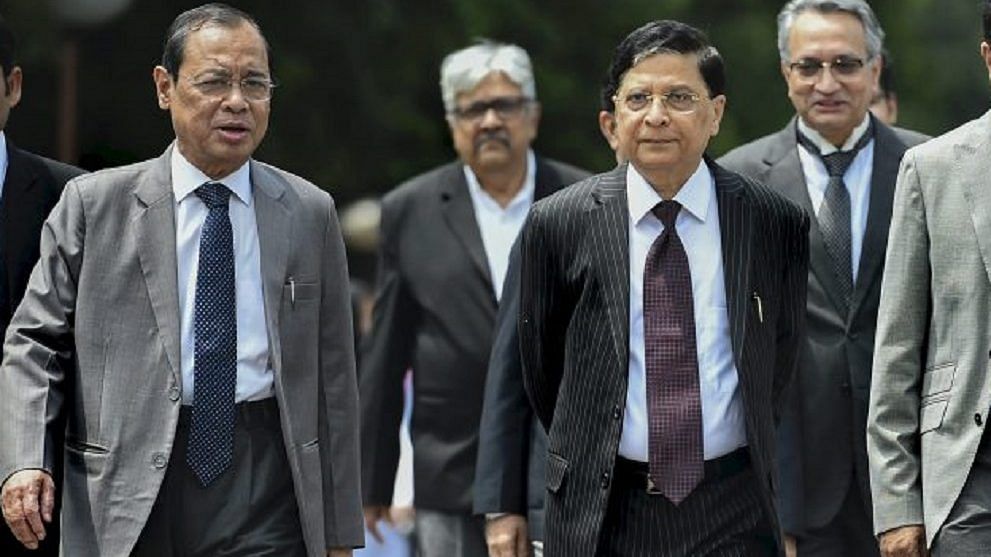It has been over two days since a former employee of the Supreme Court has accused Chief Justice of India Ranjan Gogoi of sexually harassing her. So far, the only institutional response has been the total vilification of the complainant and a striking mockery of due process.
By ignoring the issue after responding with haste, anger and paranoia, the Supreme Court will further dent whatever is left of its moral authority.
It is not the allegation itself that is a ‘matter of great public importance touching upon the independence of the judiciary’ as the Supreme Court ostensibly titled the case, but how it responded to the allegation.
After the extraordinary hearing that CJI Ranjan Gogoi used his administrative powers to preside over Saturday, it seems to be business as usual for the CJI and the 22 judges of the Supreme Court whom the 35-year-old woman had written to with her complaint about the alleged sexual harassment that took place last October.
Farcical hearing
Within hours after four media organisations published the allegations along with the vehement denial issued by the Secretary General of the Supreme Court, the CJI held an extraordinary hearing on a Saturday morning.
Walking in the ominous footsteps of his predecessor CJI Dipak Misra, whom CJI Gogoi and his three other colleagues had publicly criticised by holding an unprecedented press conference for the very same reason that he now indulged in himself — handpicking a bench to denounce allegations against himself.
Also read: SC body expresses ‘reservation’ on CJI Gogoi’s response to sexual harassment charges
During the hearing, CJI Gogoi repeatedly mentioned his (lack of) bank balance and the apparent damage to his reputation, playing the victim. He also mentioned that the complainant had a criminal case registered against her, completely ignoring the fact that neither she was present there nor had a lawyer to defend her.
CJI Gogoi also cryptically said that the allegations are an attempt to “de-activate the office of the CJI.” This sort of response from the man who occupies the highest judicial office of the country is a retrograde step for women’s rights and rule of law.
The order dictated in open court in effect had no directives. It merely expressed anguish over the developments, betraying basic principles of natural justice.
Equally disturbing was the role of the Attorney General of India (KK Venugopal) and the Solicitor General of India (Tushar Mehta) who are duty bound to assist the Supreme Court but instead chose to gaslight the victim. KK Venugopal’s ethically bankrupt comparison of the sexual harassment allegation against the CJI to criticism he draws for representing the Narendra Modi government is truly troubling. If anything, the attempt to paint CJI Gogoi’s accuser and the Modi government’s critics with the same brush is an attack on the independence of the judiciary.
The institutional problem
It is also tempting to hold CJI Gogoi personally responsible for the Supreme Court’s incredibly lopsided response and somehow hope that the institution itself is better than its people.
In fact, Ranjan Gogoi has in the past responded institutionally to any personal criticism against him.
Also read: Advocate claims he was offered Rs 1.5 crore to ‘frame’ CJI Gogoi in sexual harassment case
When former Supreme Court judge Markandey Katju had criticised a ruling of a bench led by Justice Gogoi, the latter had invited his former colleague to the court under the guise of presenting his arguments and slapped a contempt notice against him. Katju was later forcefully ushered out of the court.
Just last month, CJI Gogoi-led bench told senior advocate Sanjay Hegde that his client will not be heard because he had made some ‘very, very derogatory’ remarks against the judiciary in an unrelated matter — after making enquiries about the client’s political affiliation.
However, it is not just CJI Gogoi. The Supreme Court has set a precedent and mixed personalities with the institution.
When former Arunachal Pradesh Chief Minister Kaliko Pul committed suicide, leaving behind a purported suicide note alleging that sitting judges of the Supreme Court had been bribed, former CJI Jagdish Singh Khehar — who was named in the suicide note — decided to handpick a bench and take up the issue on the judicial front instead of setting up an inquiry on the administrative end.
Former CJI Dipak Misra also took complaints against his handling of the roster on the judicial side and passed orders in two different instances, declaring that the CJI’s administrative powers cannot be challenged.
Also read: Independence of judiciary under threat, says CJI after sexual harassment charges against him
While the CJIs created this institutional mess, other judges were happy to play along. This dangerous mix, especially when there is no accountability for the Supreme Court’s actions, is a recipe for disaster.
What next?
The judiciary has always failed the victim when sexual harassment allegations are made against one of its own. CJI Gogoi’s case has not been handled any differently so far.
The complainant’s affidavit raises serious allegations of sexual harassment and abuse of power of the office of CJI. The CJI must also explain the larger conspiracy angle he attached to the allegations – who would attack the judiciary and why?
The Supreme Court cannot continue in silence and wish away the complaint. The Internal Complaints Committee set up to deal with sexual harassment must look into the issue immediately. It is incumbent on the senior-most judges to ensure fair and transparent proceedings in the matter.
The author is a journalist based in New Delhi. She writes on law and the judiciary. Views are personal.
